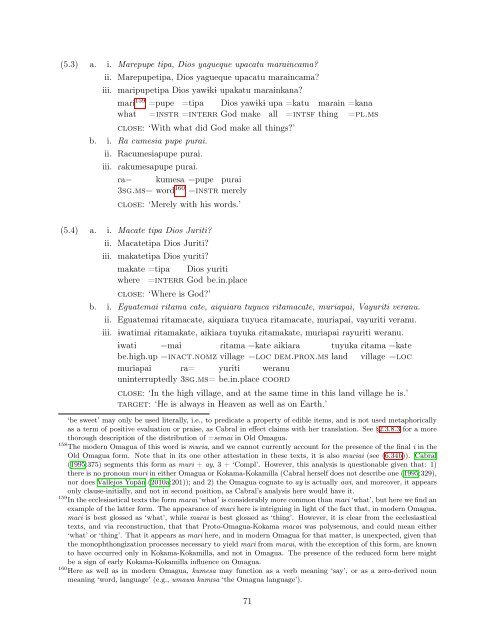draft manuscript - Linguistics - University of California, Berkeley
draft manuscript - Linguistics - University of California, Berkeley
draft manuscript - Linguistics - University of California, Berkeley
Create successful ePaper yourself
Turn your PDF publications into a flip-book with our unique Google optimized e-Paper software.
(5.3) a. i. Marepupe tipa, Dios yagueque upacatu maraincama?<br />
ii. Marepupetipa, Dios yagueque upacatu maraincama?<br />
iii. maRipupetipa Dios yaw1k1 upakatu maRainkana?<br />
maRi 159<br />
what<br />
=pupe =tipa Dios yaw1k1 upa =katu maRain =kana<br />
=instr =interr God make all =intsf thing =pl.ms<br />
close: ‘With what did God make all things?’<br />
b. i. Ra cumesia pupe purai.<br />
ii. Racumesiapupe purai.<br />
iii. Rakumesapupe puRai.<br />
Ra= kumesa =pupe puRai<br />
3sg.ms= word 160 =instr merely<br />
close: ‘Merely with his words.’<br />
(5.4) a. i. Macate tipa Dios Juriti?<br />
ii. Macatetipa Dios Juriti?<br />
iii. makatetipa Dios yuRiti?<br />
makate<br />
where<br />
=tipa Dios yuRiti<br />
=interr God be.in.place<br />
close: ‘Where is God?’<br />
b. i. Eguatemai ritama cate, aiquiara tuyuca ritamacate, muriapai, Vayuriti veranu.<br />
ii. Eguatemai ritamacate, aiquiara tuyuca ritamacate, muriapai, vayuriti veranu.<br />
iii. 1watimai Ritamakate, aikiaRa tuyuka Ritamakate, muRiapai RayuRiti weRanu.<br />
1wati =mai Ritama =kate aikiaRa<br />
be.high.up =inact.nomz village =loc dem.prox.ms<br />
muRiapai Ra= yuRiti weRanu<br />
uninterruptedly 3sg.ms= be.in.place coord<br />
tuyuka<br />
land<br />
Ritama<br />
village<br />
=kate<br />
=loc<br />
close: ‘In the high village, and at the same time in this land village he is.’<br />
target: ‘He is always in Heaven as well as on Earth.’<br />
‘be sweet’ may only be used literally, i.e., to predicate a property <strong>of</strong> edible items, and is not used metaphorically<br />
as a term <strong>of</strong> positive evaluation or praise, as Cabral in effect claims with her translation. See §2.3.8.3 for a more<br />
thorough description <strong>of</strong> the distribution <strong>of</strong> =semai in Old Omagua.<br />
158 The modern Omagua <strong>of</strong> this word is muRia, and we cannot currently account for the presence <strong>of</strong> the final i in the<br />
Old Omagua form. Note that in its one other attestation in these texts, it is also muRiai (see (6.34b)). Cabral<br />
(1995:375) segments this form as muri + ay, 3 + ‘Compl’. However, this analysis is questionable given that: 1)<br />
there is no pronoun muri in either Omagua or Kokama-Kokamilla (Cabral herself does not describe one (1995:329),<br />
nor does Vallejos Yopán (2010a:201)); and 2) the Omagua cognate to ay is actually awi, and moreover, it appears<br />
only clause-initially, and not in second position, as Cabral’s analysis here would have it.<br />
159 In the ecclesiastical texts the form maRai ‘what’ is considerably more common than maRi ‘what’, but here we find an<br />
example <strong>of</strong> the latter form. The appearance <strong>of</strong> maRi here is intriguing in light <strong>of</strong> the fact that, in modern Omagua,<br />
maRi is best glossed as ‘what’, while maRai is best glossed as ‘thing’. However, it is clear from the ecclesiastical<br />
texts, and via reconstruction, that that Proto-Omagua-Kokama maRai was polysemous, and could mean either<br />
‘what’ or ‘thing’. That it appears as maRi here, and in modern Omagua for that matter, is unexpected, given that<br />
the monophthongization processes necessary to yield maRi from maRai, with the exception <strong>of</strong> this form, are known<br />
to have occurred only in Kokama-Kokamilla, and not in Omagua. The presence <strong>of</strong> the reduced form here might<br />
be a sign <strong>of</strong> early Kokama-Kokamilla influence on Omagua.<br />
160 Here as well as in modern Omagua, kumesa may function as a verb meaning ‘say’, or as a zero-derived noun<br />
meaning ‘word, language’ (e.g., umawa kumIsa ‘the Omagua language’).<br />
71
















